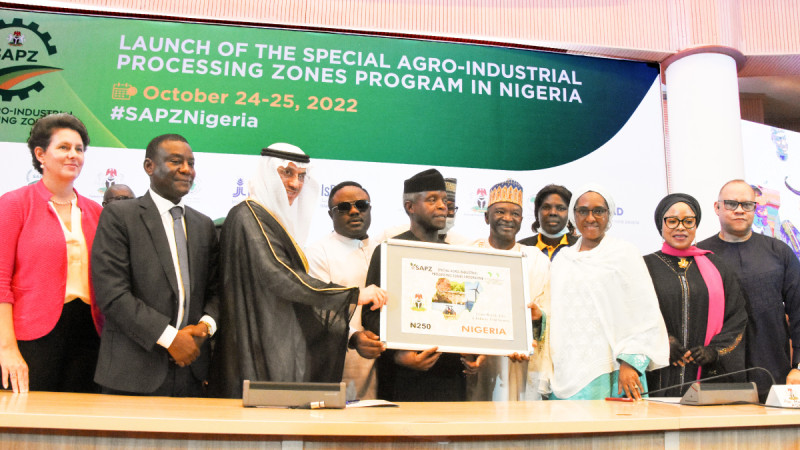The African Development Bank (AfDB), in partnership with several international development agencies, has secured $2.2 billion about ₦3.4 trillion to finance the second phase of Nigeria’s Special Agro-Industrial Processing Zones (SAPZs) programme, extending its reach to 24 states.
The announcement was made by AfDB’s outgoing president, Akinwumi Adesina, during his presentation at the 2025 Standard Chartered Bank Africa Summit in Lagos. Adesina described the SAPZs as a game-changer for Nigeria’s agriculture, with the capacity to transform the sector into a powerful engine for economic growth, food security, and job creation.
The SAPZ initiative, first launched in eight locations—Ogun, Oyo, Cross River, Imo, Kaduna, Kwara, Kano, and the Federal Capital Territory—has already begun attracting investment in infrastructure, processing facilities, and value-added agricultural businesses. With the new phase, the programme will expand to cover three times as many states, opening up opportunities for local farmers, agribusinesses, and service providers to tap into structured markets and processing capacity.
Adesina revealed that the AfDB’s partners have committed $938 million in co-financing for this phase, including contributions from the International Fund for Agricultural Development (IFAD), the Islamic Development Bank, the Japan International Cooperation Agency, and the West African Development Bank. This funding will complement AfDB’s own $934 million investment in the SAPZ programme.
He said the Bank’s focus is not just on boosting raw production but on enabling Africa to move decisively up the agricultural value chain by processing raw commodities locally, reducing dependence on imports, and creating industries that can compete globally. “To unlock Nigeria’s and Africa’s agricultural potential, we need industrial platforms that allow us to add value to what we produce,” he said.
The SAPZ model involves setting up dedicated agro-industrial hubs, equipped with power, water, roads, storage, and transport facilities, alongside processing plants for crops such as rice, cassava, maize, cocoa, and livestock products. These hubs are designed to attract private sector investors, foster linkages between farmers and processors, and reduce post-harvest losses by moving produce quickly into value-adding channels.
Adesina also confirmed that the AfDB, alongside its partners, has launched the Alliance for Special Agro-Industrial Processing Zones to fast-track the roll-out of these hubs across Africa. The Alliance has secured $3 billion in commitments to drive this continental push, with Nigeria expected to serve as one of the flagship models.
The initiative is projected to have far-reaching socio-economic benefits, especially in rural communities, where most of the zones will be located. It is expected to create thousands of direct jobs in processing, logistics, and equipment maintenance, as well as indirect jobs in supply chains, packaging, transportation, and support services. By linking smallholder farmers directly to processors and markets, the SAPZs are also expected to raise incomes, reduce poverty levels, and encourage youth participation in agribusiness.
According to agricultural economists, the expansion of SAPZs will also provide a platform for innovation in areas such as mechanisation, climate-smart agriculture, and renewable energy use in processing facilities. The hubs could become testing grounds for integrating digital platforms in agricultural trade, connecting farmers to buyers through e-commerce and improving transparency in pricing.
Adesina underscored that agriculture must be viewed not just as a means of subsistence, but as a business capable of generating wealth. “Agriculture should be seen as the oil and gas of the future. The time for Africa to industrialise its agriculture and reap the full benefits of its resources is now,” he said.
With phase two set to commence, attention will turn to state governments, private investors, and local communities to ensure the zones are developed efficiently, sustainably, and inclusively. The success of these zones could serve as a model for other African nations looking to replicate Nigeria’s agro-industrial transformation.










